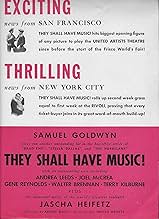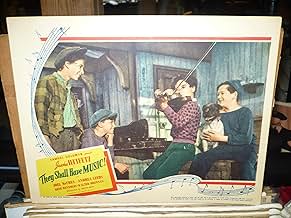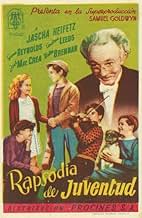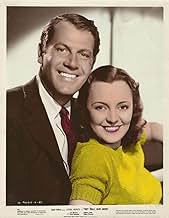Ajouter une intrigue dans votre langueA boy runs away from home and ends up at a music school for poor children. When the school suffers hard times, he enlists the aid of violinist Heifetz to save the day.A boy runs away from home and ends up at a music school for poor children. When the school suffers hard times, he enlists the aid of violinist Heifetz to save the day.A boy runs away from home and ends up at a music school for poor children. When the school suffers hard times, he enlists the aid of violinist Heifetz to save the day.
- Nommé pour 1 oscar
- 3 victoires et 1 nomination au total
Gale Sherwood
- Betty
- (as Jacqueline Nash)
Alexander Schoenberg
- Menken
- (as Alexander Schonberg)
Avis en vedette
They Shall Have Music from 1939 stars violinist Jascha Heifetz as himself, Joel McCrea, Gene Reynolds, Walter Brennan, Marjorie Main, and a favorite performer of mine, Zero the Dog. Directed by Archie Mayo.
The basic story concerns a boy (Reynolds) who runs away from home and winds up in a music school for kids. Gifted musically, he attempts to help the school stay open by appealing to Heifetz.
The star, of course, is Heifetz' magnificent playing. Though the film states he plays a Stradivarius, that violin name was thought to be more recognizable to audiences than his actual instrument, a Guarnarius. How wonderful to have Heifetz' gorgeous work on film.
If you like opera, you haven't lived until you've heard nine-year-old Gale Sherwood singing Caro Nome. I know hearing a child squeak out the coloratura was a life-changing experience for me.
In fact, Gale Sherwood grew up to be a lovely soprano who made films, did a nightclub act with Nelson Eddy, performed The Desert Song on tv, and Showboat at the LA Music Center. Then she moved to Florida and retired. She can be heard as an adult on YouTube.
I saw Zero the Dog in High Sierra. His role on that film was a tad more dramatic, but he was a delightful thespian and did a great job in this.
The basic story concerns a boy (Reynolds) who runs away from home and winds up in a music school for kids. Gifted musically, he attempts to help the school stay open by appealing to Heifetz.
The star, of course, is Heifetz' magnificent playing. Though the film states he plays a Stradivarius, that violin name was thought to be more recognizable to audiences than his actual instrument, a Guarnarius. How wonderful to have Heifetz' gorgeous work on film.
If you like opera, you haven't lived until you've heard nine-year-old Gale Sherwood singing Caro Nome. I know hearing a child squeak out the coloratura was a life-changing experience for me.
In fact, Gale Sherwood grew up to be a lovely soprano who made films, did a nightclub act with Nelson Eddy, performed The Desert Song on tv, and Showboat at the LA Music Center. Then she moved to Florida and retired. She can be heard as an adult on YouTube.
I saw Zero the Dog in High Sierra. His role on that film was a tad more dramatic, but he was a delightful thespian and did a great job in this.
I think Samuel Goldwyn was trying to accomplish two things in this film. First the film is a homage to Jascha Heifetz, considered to be the best violin virtuoso of the past century. Secondly having brought to the screen the Dead End kids with his film of the same title and seeing them sign with Warner Brothers, he was trying to create a second gang of appealing urchins.
Though the film was good there certainly was no demand that the kids from this film be reteamed for another feature.
Leader of the gang is Gene Reynolds who at one time played the violin, but now leads a street gang of disreputable urchins. His stepfather, Arthur Hohl, breaks the violin his late father gave young Reynolds and threatens to send him to reform school over the feeble protests of his mother Marjorie Main.
Young Reynolds happens to stumble onto a music school run by the old music maestro himself, Walter Brennan and his daughter Andrea Leeds. They take him in, but they have their financial problems with a lot of creditors led by Porter Hall.
This film is mostly to be seen today because it's a chance for classical music lovers to see and hear Jascha Heifetz who as you gather is the solution one way or another to everybody's problems. Joel McCrea is in this film also, but has a rather colorless part as Andrea Leeds boyfriend.
Besides Heifetz, one thing the film does do is touch on, albeit gingerly on the topic of child abuse and battered spouses. Arthur Hohl is one mean man and Marjorie Main is very clearly a much battered wife.
The kids in the cast do well, Reynolds, Tommy Kelly, Terry Kilburn and a young girl under the name of Jacqueline Nash who grew up and performed as Gale Sherwood, nightclub partner to Nelson Eddy. She had a nice soprano even as a child.
But it's Heifetz you see the show for.
Though the film was good there certainly was no demand that the kids from this film be reteamed for another feature.
Leader of the gang is Gene Reynolds who at one time played the violin, but now leads a street gang of disreputable urchins. His stepfather, Arthur Hohl, breaks the violin his late father gave young Reynolds and threatens to send him to reform school over the feeble protests of his mother Marjorie Main.
Young Reynolds happens to stumble onto a music school run by the old music maestro himself, Walter Brennan and his daughter Andrea Leeds. They take him in, but they have their financial problems with a lot of creditors led by Porter Hall.
This film is mostly to be seen today because it's a chance for classical music lovers to see and hear Jascha Heifetz who as you gather is the solution one way or another to everybody's problems. Joel McCrea is in this film also, but has a rather colorless part as Andrea Leeds boyfriend.
Besides Heifetz, one thing the film does do is touch on, albeit gingerly on the topic of child abuse and battered spouses. Arthur Hohl is one mean man and Marjorie Main is very clearly a much battered wife.
The kids in the cast do well, Reynolds, Tommy Kelly, Terry Kilburn and a young girl under the name of Jacqueline Nash who grew up and performed as Gale Sherwood, nightclub partner to Nelson Eddy. She had a nice soprano even as a child.
But it's Heifetz you see the show for.
I caught a clip of this film with Heifetz's performance of Tchaikovsky's Violin Concerto on YouTube - which was phenomenal. Watching the performance from the wings with Andrea Leeds was an actor who looks exactly like Frank McHugh (with mustache), but there's no mention of him in the cast, or of this appearance on his biography page. I assume he was an extra even though he was rather prominent in this single(?), non-speaking appearance in the film. Can anyone confirm if it was him, one way or the other?
Does anyone know if this movie is available on VHS or DVD? I remember seeing it, I believe, on TV, but I'm not certain as to whether I watched a clip of it in a documentary biography of Heifetz, or saw the film, itself.
Does anyone know if this movie is available on VHS or DVD? I remember seeing it, I believe, on TV, but I'm not certain as to whether I watched a clip of it in a documentary biography of Heifetz, or saw the film, itself.
You may have heard that music is the universal language. Nowhere is that more true than in Archie Mayo's "They Shall Have Music". It focuses on a troubled boy who runs away from home and joins a struggling music school. Things take a turn when Jascha Heifetz (playing himself) enters the scene.
The movie addresses poverty and funding for the arts. And in the process, we get to hear some masterful performances of works by the great composers (and of course, during the Barber of Seville overture, I pictured Bugs Bunny subjecting Elmer Fudd to all sorts of humiliation to the tune of the overture). No surprise that the children perform the music exquisitely, since Samuel Goldwyn hired the Meremblum Orchestra to star in the movie.
It might not be the greatest movie ever made, but I hope that it reminds people of the importance of the arts. Indeed, during WWII, Winston Churchill got asked if he planned to cut funding for the arts to redirect the money to the armed forces, and he said "Then what are we fighting for?" Alfred Newman's Academy Award-nominated score is like a character by itself. I definitely recommend this movie.
The movie addresses poverty and funding for the arts. And in the process, we get to hear some masterful performances of works by the great composers (and of course, during the Barber of Seville overture, I pictured Bugs Bunny subjecting Elmer Fudd to all sorts of humiliation to the tune of the overture). No surprise that the children perform the music exquisitely, since Samuel Goldwyn hired the Meremblum Orchestra to star in the movie.
It might not be the greatest movie ever made, but I hope that it reminds people of the importance of the arts. Indeed, during WWII, Winston Churchill got asked if he planned to cut funding for the arts to redirect the money to the armed forces, and he said "Then what are we fighting for?" Alfred Newman's Academy Award-nominated score is like a character by itself. I definitely recommend this movie.
A bright youngster interested in "serious" music (admittedly a vanishing breed--who'll play the fiddle when no one can play the violin??"--could find this an interesting fiction about street kids and great musical stars. Heifitz was indeed the greatest violinist of his generation and the film gives him a rare on-screen chance to display his technique. The kids, especially Gene Reynolds, are fine and, all in all, the pic is a good example of first-rate studio family fare of the late 30's. It doesn't hit the top of the great '39 list, but it's a nice way for an intelligent family to spend a rainy afternoon with AMC or the Video Store--- good luck at Blockbuster!!!!
Le saviez-vous
- AnecdotesIn the movie, the newspaper account lists Jascha Heifetz's stolen violin as a Stradivarius. Heifetz used a Guarnarius in the picture and favored that violin in real life, but the producers felt that the name of Stradivarius would be more recognizable.
- GaffesThroughout the picture, the kids in the orchestra are caught looking into the camera or eyeing it sideways, licking their lips, fidgeting, etc.
- Bandes originalesAndante cantabile
from "String Quartet No.1 in D, Op.11" (1871) (uncredited)
Written by Pyotr Ilyich Tchaikovsky
In the score during the opening credits
Reprised a bit by Gene Reynolds (violin)
Meilleurs choix
Connectez-vous pour évaluer et surveiller les recommandations personnalisées
- How long is They Shall Have Music?Propulsé par Alexa
Détails
- Durée
- 1h 42m(102 min)
- Couleur
- Rapport de forme
- 1.37 : 1
Contribuer à cette page
Suggérer une modification ou ajouter du contenu manquant
























